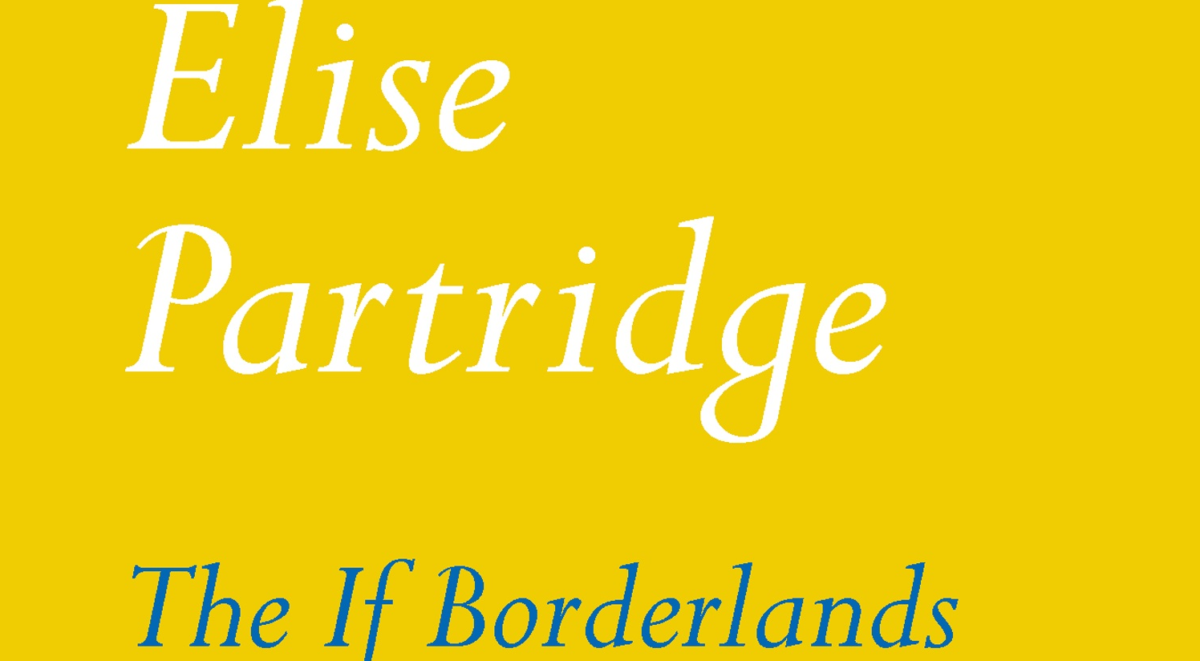
Compiled and introduced by Rob Taylor
 Poet and editor Elise Partridge passed away in early 2015, months shy of seeing the publication of her third poetry collection, The Exile’s Gallery (Anansi, 2015), and soon after poems from that book appeared in PRISM international 53.1. An American born and educated poet, in 1992 Elise moved with her husband Stephen to Vancouver, where she lived for the rest of her life. Her poetry, too, was transnational, reaching an enthusiastic audience in both Canada and the United States. Her poems were frequently published in the two countries’ leading magazines, including The New Yorker, Poetry, and The Walrus.
Poet and editor Elise Partridge passed away in early 2015, months shy of seeing the publication of her third poetry collection, The Exile’s Gallery (Anansi, 2015), and soon after poems from that book appeared in PRISM international 53.1. An American born and educated poet, in 1992 Elise moved with her husband Stephen to Vancouver, where she lived for the rest of her life. Her poetry, too, was transnational, reaching an enthusiastic audience in both Canada and the United States. Her poems were frequently published in the two countries’ leading magazines, including The New Yorker, Poetry, and The Walrus.
A second posthumous book, The If Borderlands: Collected Poems, was published earlier this year by New York Review Books. It gathers together Partridge’s three poetry collections (two in the US, where Fielder’s Choice and Chameleon Hours were published together under the latter title), alongside seven previously unpublished poems.
That Partridge only wrote three books in her life was a sign of how meticulously she approached each poem. And a writer of poems she was: though her collections often held together thematically (circling around the major events in her life at the time of their writing), each poem was designed to stand independently. Much was said about Elise Partridge the person, or the poet writ large, following her death, but far too little space was available to zero in on individual poems, lines, and syllables – which was exactly what Partridge was famed for doing in her writing.
To celebrate the release of Partridge’s Collected, I asked poets on both sides of the border to share their favourite Elise Partridge poems. You can read the full texts of the poems by clicking on the poem titles (and you should—they’re very good!).
Asa Boxer on “Dislocations” (Fielder’s Choice, p. 51 in The If Borderlands)
During the last hurricane
an iguana…
It’s hard to pick favourites with a poet like Elise Partridge, so I won’t try. All I can do is make a few arbitrary choices and settle on something. I go back to Fielder’s Choice, her 2002 debut collection with Signal Editions. As it happens, I returned to Montreal in 2002, after 10 years living abroad, and Elise’s book represented an exciting promise to me. Not only were the poems linguistically beautiful and rich with imagery, but her work brimmed with implications and insights. I was proud to be of a generation of poets like Elise. If I ever wanted to be counted among the better poets of our time, I felt I had my work cut out for me. On page 55 of that book is a poem entitled “Dislocations.” I appreciate it for its visceral sensibility, how it makes you feel the things it says: “you’re//…a pollen-nub / saddlebagged by a bee / that bumbled into an orchid / thinking—it had the right markings—/ it was his beloved.” The reader is invited to experience the confusion of love as a kind of bee-like bumbling—how true! And again at the end of the poem “you’re startled as the young tree / that suddenly keeps finding peaches at the end of its limbs.”
Amanda Jernigan on “Chemo Side Effects: Memory” (Chameleon Hours, p. 106 in TIB)
Where is the word I want?
I read my first Elise Partridge poem just after her death: an order of events that must occur with sad frequency, obits so often flagging for us the people we wish to have known, the writers we wish to have heard. The poem was “Chemo Side Effects: Memory,” republished from Chameleon Hours on the web site of the Poetry Foundation. Reading it after Partridge’s death, I assumed, incorrectly, that it reflected her treatment for the colon cancer that would eventually kill her. In his thoughtful, appropriately minimalist afterword to The If Borderlands, Stephen Partridge indicates that the poem was in fact written in the wake of an earlier diagnosis: breast cancer, for which Elise Partridge was treated in 2001-02, and from which she recovered. In The If Borderlands, I read the poem in context for the first time, in the suite of poems that begins the second section of Chameleon Hours: “Cancer Surgery,” “Prognosis: 50-50,” “Room 238: Old Woman and Hummingbird,” “Chemo Side Effects: Memory,” “Chemo Side Effects: Vision,” “Childless,” “First Days Back at Work,” “Granted a Stay.” It is a riveting sequence: the rigorous unsentimentality that characterizes Partridge’s earlier poems is here as well, now turned on the poems’ cancer-patient speaker; but I feel, too, like colours blazing in the dark (“… topaz in the mind’s blank”), the fierceness of the speaker’s hope, in the midst of her treatment, the queasy intensity of her relief when she is “granted a stay.” Then, too, there is the undiminished power of her attention, which can link right words to the most slippery of experiences. “Chemo Side Effects: Memory” is my favourite of the sequence: in its mot-juste precision it is a great, exuberant eff-you to the amnesia it describes, hauling up jewel after jewel from the poet’s “dragon’s trove” (thicket, dumbwaiter, gondola, flare …). At the same time, it is able to see — and let the reader see — the wordlessness the poem resists as a place not just of frustration but of wonder. There’s an amazing large-spiritedness to that — and a reminder that silence is not just the end, but the source, of language.
Anita Lahey on “A Valediction” (Fielder’s Choice, p. 19 in TIB)
 Thump on the roof.
Thump on the roof.
The owl again?
Rising short shrieks—
I relate to the indignation and terror in this poem. That any existence could be cut off without warning seems like a betrayal of the very ferocity of being, that constant interior I AM. It is just like Elise to address this problem through the misfortune of a rodent instead of a seemingly grander creature. To call its shrieking a “valediction” grants weight and dignity to a modest life and its loss. I recognize a generosity in this poem that is particular to Elise’s work, and that brings me back to her poems because it manifests as openness, as an offering of kinship and comfort. Yes, in Elise’s hands, even this brutal tale brings me comfort. Elise attempts three times (three!) to translate the caught creature’s cries. She reenacts its final oblivious moments of busy contentment. The scene emerges through sound—a thump and ten shrieks—and via that one sense, the poem sidesteps into another: sight. We envision the gruesome scene along with the listening narrator. The creature’s fate imagined this way hits harder than if it were witnessed with the eye, I think, because we (at least this is true for me) are wont to imagine, at unexpected and idle moments, horrific ends for ourselves and our loved ones. Finally: note how many more words it took me to share my appreciation of this poem than the poem itself required. Elise was a master of her craft, and a gift and model for us all.
Christopher Levenson on “The Imaginary Encyclopedia” (The Exiles’ Gallery, p. 197 in TIB)
 —Truces that never occured,
—Truces that never occured,
signed by dignitaries
in Great Hall ceremonies
wearing their conjured eras’ odd chapeaux…
In a review of her last book, The Exiles’ Gallery, published in Event, I remarked on Elise’s “democracy of perception.” In “Years On,” where she looks at an old high school class photo and recalls her classmates’ total inability to imagine what would happen to them, the poem ends with “The girl who lost her mind— / No one can find her now— / grins from row four. / She always came first in hurdles, / seven straight years.” By contrast, in “The Imaginary Encyclopedia” she imagines an alternative “to World Books, Britannicas—where /someone in a glaring lab / is congratulated on breakthroughs / whose unforeseeable application / will result in a billion graves.” “It would skimp /on the descent of kings /or a towering GNP,/ in favour of long bios/ of mothers who walked miles for water,/ a farmer who shared his well.” As all good poetry should, hers is constantly making connections between small scale, everyday events and the wider world, the personal and universal. But she does so deftly, en passant, by allusions and images so that her readers are not conscious of any hierarchy of feelings or perceptions. Neither the language nor the subject matter is recondite, and there is no showing off: Elise is a sophisticated writer who assumes our knowledge of and interest in the world as it is and should be. We could hardly enjoy her work unless we shared, or at least aspired to share, a comparable humanity. Like the farmer, Elise certainly shared her well. In fact, what finally strikes me about her work is a kind of constant systolic/diastolic interflow of self and world that distinguishes major poetry.
Phillis Levin on “Arcadia” (Fielder’s Choice, p. 10 in TIB)
Everything at your farm was new to me—
How bittersweet it was last February to happen by chance upon a copy of Elise’s collected poems, The If Borderlands. It is a beautifully produced literary object that would have given Elise joy to behold—its fine design honoring the marvelous poems within. Leafing through its pages I was filled with gratitude for the multi-faceted gift Elise gave to us, to the world—through her being, through her poems; and I was overwhelmed again by the familiar wave of loss that carries us back to her, to who she was.
Who Elise Partridge was—and continues to be—is different for each of us. Her subtle voice, its surprising variations and unfailing musicality and wit, endures in memory, on the page, in the air we breathe when reciting her lines aloud. Elise’s gentle presence may have seemed, at first, a startling contrast to her fierce intellect and artistic ambition. But I believe her abiding kindness and acute intelligence were qualities inseparable in her nature; that her exacting aesthetic sensibility, an unwavering attention to detail combined with acceptance of mystery, fostered her modest disposition and emboldened her in her art. Responsiveness and responsibility are related human propensities that do not always coexist with such grace in one human being. Elise’s responsiveness to nuances of sound, sight, and meaning is manifest in the modulations of thought, image, and rhythm that shape her poems; this potentially isolating sensitivity opened her to the world, made her more in tune with others. Her life’s work is a testament to attunement—to persons, to ideas, to Nature in all its concrete particulars, and to whatever is fleeting, wild, unrepeatable, authentic, summoning somehow the eternal.
In her poem “Arcadia” I find a line and a half of verse that cuts to the quick: “to notice what I’d never seen / without your love”. In the intimacy of this address to the beloved, we recognize a truth that feels inevitable: a sure sign that we are in the presence of the genuine. The border between two people in love is clearly drawn—and then clearly dissolves. The border between the poet and the world, between writer and reader, subject and object, is just as permeable. This lyric instantly reveals a signature gesture: Elise Partridge embodies in the very turn of a line how a poem itself becomes a borderland, a place to celebrate and create interconnections unbound.
Nyla Matuk on “Waltzing” (The Exiles’ Gallery, p. 170 in TIB)
 I can see just so much
I can see just so much
from my studio flat
through the slanting snow…
This poem is a perfect triptych, or dialectic: an observation of the speaker’s neighbours dancing with their children in stanza one is a gambit for a slightly unsettling memory in stanza two, in which the speaker’s mother confides a certain joylessness about her wedding: “I wanted it over with.” The speaker can hear neither the noise that must have surrounded her parents as they are captured in the wedding photograph at hand, having confetti thrown at them, nor her neighbours as she watches their joyful family scene from her studio flat. It’s all carefully placed in the narrative thread, in the way Elise so expertly executed. And then in stanza three, the last lines reveal the fissure. It’s a fleeting but deeply registered kind of silence: ‘They flick off the ceiling bulb, / conga out of sight / to their inaudible tune.” Inaudible too was the mother’s joylessness in a photo from the past, and we’re left wondering about the future for the young family across the way. As with so many of Elise’s poems, we are quietly devastated; barely would we have heard the approach of this music of what happens.
Jeredith Merrin on “For a Woman Born in the 1930s” (The Exiles’ Gallery, p. 168 in TIB)
 Her inner itineraries—
Her inner itineraries—
trails hacked by love and need—
were recorded in ruins
that faded.
This is a clear-eyed yet compassionate lyric about the choice of domestic or “inner itineraries” over outward-bound adventurousness. Its protagonist has made the female choice common to her decade: she did not, like Huck Finn, “light out for the Territory.”
In the eighteen-line poem, which falls into three six-line sections, the first establishes a life delimited, adventure foundered on a “sugarbowl’s dunes.” The second takes up the might-have-been (the woman’s un-undertaken voyages) and concludes with another kitchen-table image, the kayak-shaped relish dish. There’s a strong shift—a sonnet-sestet-like turn—as we move into the final six lines, where the reader is invited to “Hoist” the woman’s pristine white leather valise, an unused girlhood gift with its poignantly intact “aura of vista and risk.” (The verb “Hoist,” for me, echoes Housman’s “To an Athlete Dying Young,” in which the victor is lifted “Shoulder-high” in a chair through the marketplace. Elise’s poem is offering a different, and differently melancholy, kind of tribute.)
What pleasures of sound-craft throughout Elise’s collected poems! I read this one aloud, relishing, and then noticed: the third and sixth lines of each section rhyme (“runes”/”dunes”; “dish”/”relish”; “risk/ brisk”). The lyric, opening with long, yearning-toward-adventure “ee” sounds (“itineraries,” “needs”), aptly concludes with hard consonants (“risk,” “locks,” “brisk”). Even as the untarnished brass locks of the unused suitcase pop open, the music of the poem suggests possibility snapped shut.
Rachel Rose on “Buying the Farm” (Chameleon Hours, p. 113 in TIB)
 Crossing over—
Crossing over—
will we be standing at a dory’s prow,
clouds cooperating grandly in the background…
In the months after Elise Partridge died, I took the opportunity to read her poem, “Buying the Farm,” at as many of my own readings as possible. In this short poem, Partridge takes a few euphemisms about death and gives life to them in a rich cascade of images and metaphor. There is something luminous and even buoyant about this poem examining death, when surely she was contemplating her own with some regularity—the individual, crossing over, becomes of no more importance than a single snowflake. What has stayed with me most, though, is the last stanza, where she writes of death being the end of the show (“It’s curtains for us”) and that finally, at the end, the true self can be revealed, without the masks of gender or theatre or anything else intervening. This, to me, remains a vital image of true love, the kind of love Elise Partridge was blessed to know, and to give.
Phoebe Wang on “Farewell Desires” (Chameleon Hours, p. 118 in TIB)
 To unwind yourself like Houdini
To unwind yourself like Houdini
from desires’ pinioning buckles…
From afar, the diamond-tipped elements of “Farewell Desires” appear balanced on a rim. Elise takes a slippery, abstract subject matter, that of renunciation, and grounds it in precise and artful imagery. Moving closer, I am even more impressed and affected by how her discarding of her “green wants,” of desire itself, is described in such tangible and earthly terms—buckles, dories, ditches, blooms, maple seeds and “magpie curios,” as if she wants to survey the collected world and to savour it one last time before her final letting go. Integral to this poem’s structure are her trademark clenched diction, her wry, wrought tone and her lean stack of assonant clusters. Its lines are askew, but nothing topples, even when the poem’s density and waywardness tapers down to the finality of the “plain road” that awaits her, that awaits all of us.
 The If Borderlands can be purchased from the publisher, or from your local bookstore, or from you-know-who, among other places.
The If Borderlands can be purchased from the publisher, or from your local bookstore, or from you-know-who, among other places.


